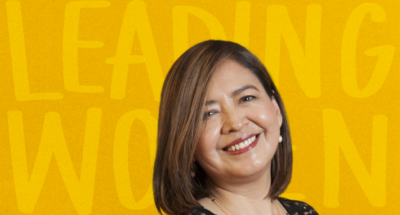
How to teach an entrepreneur to let go
Biotech entrepreneur Juana Lucia Flores-Candia explains that technology has changed the way to mentor chief executives. Here are her three ways to get entrepreneurs to focus....

by Natalia Olynec Published 8 November 2022 in Sustainability • 6 min read
With fatal floods in China, Pakistan, and Europe and wildfires in the US and Australia making headlines across the globe, the disturbing signs of climate change are hard to ignore. Yet many firms lack the leadership to scale sustainable business models to mitigate the irreparable damage brought by a warming planet.
Corporate leaders who tinker around the edges and stick to familiar playbooks, incremental change, and business models are unlikely to help them meet their ambitious carbon goals. The recent InfluenceMap map report showed BP, Chevron, ExxonMobil, Shell, and TotalEnergies spend $750m a year touting their climate credentials, but only 12% of capital investment on low-carbon development.
While many companies produce sustainability reports and set net zero carbon targets, those with a clear roadmap for achieving their carbon goals are still a minority. So, how can senior executives move beyond words to take bold leadership that creates positive impact business models for a more sustainable future?
One aspect of climate leadership is often overlooked – the role of emotions. Emotional responses to climate change often elicit the courage to drive transformational change. Acknowledging the role that climate grief, in particular, must play in corporate transformation can help unleash the energy to reimagine the world and lead change. The process of grief helps us adjust by “reimagining the world” after something is lost.
A new generation of young climate activists inheriting this crisis is driven by climate grief and anxiety to take to the streets as part of the “Fridays for Future” movement. One study published in The Lancet shows that 45% of young people say that climate change negatively affects their daily life and functioning, including their ability to eat, concentrate, and sleep. More than half reported feeling sad, anxious, angry, helpless, and guilty.
Facing the emotional side of climate change can also prompt senior executives to take bolder action in their leadership roles.
Tackling climate change is “pitched to us as an engineering problem”, but really it is a “psychological one”, says Richard Powers, author of the award-winning book The Overstory. People resist when told they must “be less: to use less, travel less, consume less”, he said. “They are grieving for the death of a system that can’t be saved.”
Climate discussions and debates require scientific rationality yet are often emotionally charged. Sustainability leadership is complicated by the need to mobilize collaboration among networks of business, policymakers, and civil society to tackle the vast array of related mega-challenges – pollution, ocean acidification, loss of biodiversity, and overpopulation. The Intergovernmental Panel on Climate Change (IPCC) this year issued its most dire warning yet on the risks of rising temperatures. Time is short, so to prevent some of the worst impacts of climate change we must work together to slash carbon emissions by 45% by 2030.
One of the main aims of a grieving process is “the adjustment to a new environment“, said researchers William Worden and Thomas Atig. While they referred to the loss of a loved one, these definitions can also be applied to grieving the changing climate. We will need to reimagine the world not like it was, or how we would like it to be, to lead our firms to contribute to innovative adaptive solutions.
When is grief an important element of sustainable business transformation? In organizations “people don’t resist change…they resist loss”, say Marty Linsky and Ronald Heifetz in their book Leadership on the Line. They block change when they feel a loss that can involve status, roles, routine, relationships, reputation, or any familiar experience. Change requires facing the anxiety related to losing control and accepting realities we would otherwise conveniently avoid.

Still, ecological grief, unlike other forms of grief, is a form of “disenfranchised grief” or a grief that is not often publicly or openly acknowledged. This type of grief is associated with knowledge of the destruction of the natural world, which feels both intangible and challenging to fully comprehend. The American Psychological Association (APA) in 2017 released the “Mental Health and Our Changing Climate” report which described the psychological trauma caused by natural disasters as well as the significant mental health impacts from longer-term climate change.
But naming and acknowledging these changes and emotions on both an individual and even firm-wide level can help navigate the transformation needed to ensure our firms are future-ready. It can help shift perception of the changing environment from being a threat to an opportunity for new type of business solutions or models.
In the developing field of climate psychology, those who have been through climate grief are referred to as “climate aware” people who have had a powerful emotional “wake up” moment.
The Good Grief Network, a non-profit focusing on emotional responses to the climate crisis, asserts that companies have an important role in normalizing discussions in this space.
“It’s important for businesses to address this issue by acknowledging that there’s nothing ‘wrong’ with people who experience burnout, climate anxiety, and grief; actually, these heavy emotions are a very healthy response to the intersecting crises we face as a society,” says Executive Director Sarah Jornsay-Silverberg. The Good Grief Network has created a 10-Step Program to facilitate these emotional conversations and commit to meaningful action.
This process can follow the well-known stages of grief as described by Elisabeth Kübler-Ross: denial, anger, bargaining, depression, and acceptance. Reaching the final phase of acceptance is essential for learning and the ability to move on.
Sarah Jaquette Ray, author of The Field Guide to Climate Anxiety: How to Keep Your Cool on a Warming Planet, agrees. “The way ahead will require not just the science of climate, but the science of emotions, to help us balance apathy, fear and despair with efficacy, compassion and desire.”
Grief can be a creative force that turns loss into inspiration, according to Charles Dhanaraj and George Kohlrieser. They argue that, to overcome grief, leaders must become aware of the problem, accept the pain of the loss, and find meaning in new actions. Paying attention to the emotions that come with disruptive change is essential to steering organizations through a transformation.
When a leader reaches the stage of acceptance of climate change, their ability to take steps to change their organization increases, whether developing new strategies, or implementing changes in resource allocation, products, services, or markets. The shift is towards opportunity-seeking behavior from threat aversion.
Outdoor apparel company Patagonia’s founder Yvon Chouinard is likely one of the boldest corporate sustainability leaders who has embraced this emotional process. Chouinard, who founded Patagonia 50 years ago, recently announced he and his family transferred their ownership of the firm valued at about $3 billion, to a specially designed trust and a nonprofit organization. The structure will ensure that all profits – about $100 million a year – will be used to combat climate change and protect undeveloped land.

Patagonia aims for exponential impact by hosting a digital platform that informs people of local activism opportunities in the categories of land, water, climate, communities, and biodiversity. While most firms are unwilling to give up control in this way, Chouinard’s approach can still be a source of inspiration.
Climate grief is an important conduit for bold moves that can mitigate climate change, he explained in a promo video for the platform. “If you’ve been paying attention, you’ll know that things aren’t going very well for the planet. It’s pretty easy to get depressed about it. I’ve always known that the cure for depression is action.”
Making time for tough conversations on climate in our firms can harness grief for inspiration to drive action and sustain the momentum of sustainable business transformation.

Chief Sustainability Officer at IMD
Natalia is the Chief Sustainability Officer at IMD. She designs and implements sustainability strategy, develops executive education programs and advisory, publishes research, builds cross-sector partnerships, and communicates IMD’s ambitions and progress. The Center for Sustainable and Inclusive Business, co-led by Olynec, aims to support leaders and companies to take steps towards a more sustainable and inclusive business world by harnessing IMD’s knowledge and expertise in the area and offering tools to help them deliver systemic, innovative, and impactful responses.

20 November 2023 • by Juana Lucia Flores-Candia in Leadership
Biotech entrepreneur Juana Lucia Flores-Candia explains that technology has changed the way to mentor chief executives. Here are her three ways to get entrepreneurs to focus....

17 November 2023 • by Michael D. Watkins in Leadership
Executives winning promotion must navigate their transition with a balance of humility, respect for legacy, and a vision for the future....

14 November 2023 in Leadership
Henrik Andersen discusses with IMD President Jean-François Manzoni the challenges of navigating supply chain disruptions and soaring raw material costs over the past three years, and why he changed the wind farm...

6 November 2023 • by Brenda Steinberg, Michael D. Watkins in Leadership
Strategic thinking is key to career advancement – but communicating it to others is just as important. Ask yourself these 10 questions to find more ways to demonstrate your strategic abilities to...
Explore first person business intelligence from top minds curated for a global executive audience